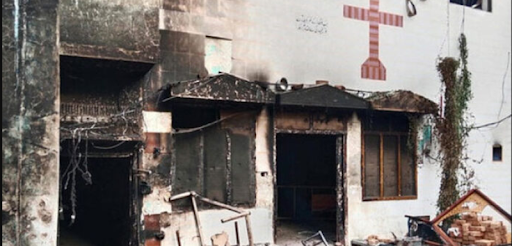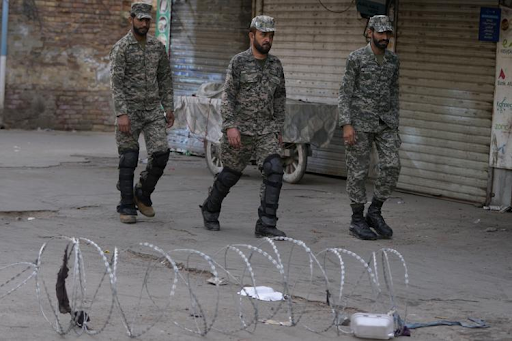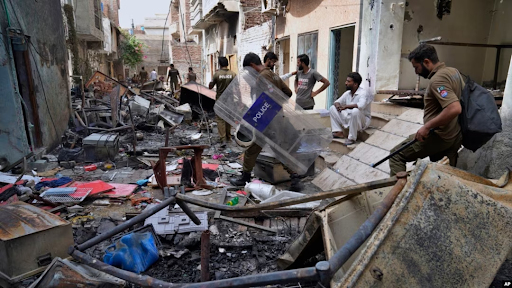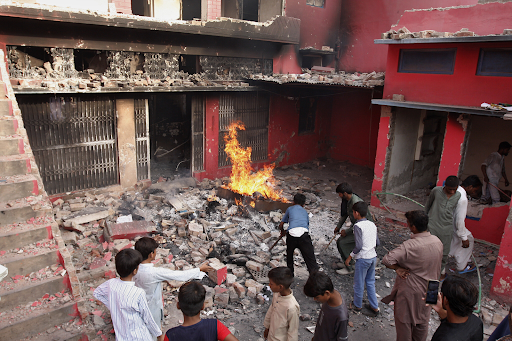
A wave of unrest has engulfed Jaranwala, a city in eastern Pakistan, where more than 100 individuals have been apprehended following a series of alarming events that saw churches set ablaze and homes of religious minorities vandalized by thousands of Muslim protesters. The catalyst for this eruption of violence was the allegations that two Christian men had defaced pages from the Quran, Islam’s revered holy text. As the smoldering ruins of the historic Salvation Army Church attest, tensions remain palpable, casting a shadow over the city.
The aftermath of these events has rippled across the region. Authorities have imposed a seven-day restriction on public gatherings in the Faisalabad district, encompassing Jaranwala, in a bid to quell the escalating tensions. Amidst the chaos, a grim irony persists—the two Christian men accused of blasphemy, a charge that carries the possibility of the death penalty in Pakistan, remain at large, their whereabouts unknown.
Although Pakistan has yet to carry out executions based on blasphemy charges, mere allegations have triggered widespread and often violent responses, from riots to lynching. The unverified reports of the desecration of the Quran, coupled with blasphemous content supposedly written in red marker ink, ignited fury among the Muslim community.

The outrage culminated in organized mobs targeting Christian homes, looting and setting possessions ablaze in the streets. Disturbing videos circulated on social media platforms captured the intensity of the violence, with police presence seemingly passive or overwhelmed.
Beyond the immediate destruction, this incident underscores a broader pattern of religious violence in Pakistan, where minority religious groups often find themselves vulnerable to persecution. The adoption of stringent blasphemy laws, including the death penalty for such offenses, has come under scrutiny for fanning the flames of extremism and intolerance.

The unfortunate escalation of religion-fueled violence is not a new phenomenon in Pakistan. In fact, it has been on the rise since the imposition of stricter blasphemy penalties. Experts highlight a complex interplay of factors, including economic disparities, the emergence of extremist factions, and a deepening societal fragmentation, all contributing to the surge in violence against religious minorities.
The violent group responsible for the church burnings has been linked to the Tehreek-e-Labbaik Pakistan (TLP), an Islamist political party. However, the TLP denies any involvement. This revelation only adds another layer of complexity to the situation, as questions arise about the role of political parties in inciting or leveraging religious sentiments for their gain.

The incidents in Jaranwala are prompting calls for swift and decisive action. The gravity of the situation has spurred reactions from governmental authorities, with Amir Mir, the information minister for Punjab province, condemning the alleged blasphemy and affirming that a significant police presence has been deployed to the area.
The repercussions extend beyond physical destruction; they unveil the precarious balance between religious sentiments, legal frameworks, and societal stability. Pakistan’s blasphemy laws, inherited from British colonial rule and bolstered in the 1980s with more stringent penalties, continue to reverberate as a deeply divisive issue in the nation.

Amidst these grave concerns, the immediate priority is to restore calm to Jaranwala and address the immediate needs of those affected by the violence. However, the incident also serves as a rallying point for deeper conversations about religious harmony, the rights of religious minorities, and the urgent need to address the root causes of religious extremism.
The events in Jaranwala underscore the delicate task of balancing religious sensitivities, the rule of law, and societal harmony. They remind us of the critical importance of fostering an inclusive and tolerant society that can safeguard the rights of all citizens, regardless of their religious beliefs.





